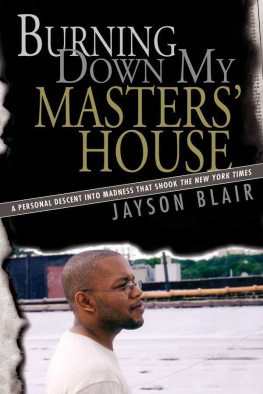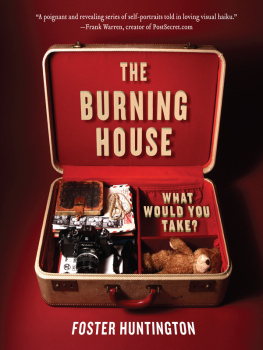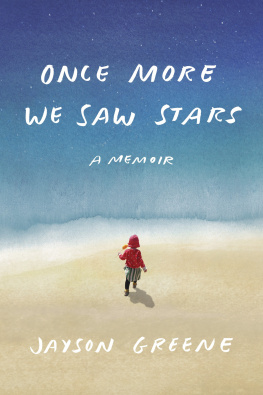Jayson Blair - Burning Down My Masters House: A Personal Descent Into Madness That Shook the New York Times
Here you can read online Jayson Blair - Burning Down My Masters House: A Personal Descent Into Madness That Shook the New York Times full text of the book (entire story) in english for free. Download pdf and epub, get meaning, cover and reviews about this ebook. City: Beverly Hills, CA, United States, year: 2004, publisher: New Millennium Press;Goose Creek Consulting, LLC, genre: Detective and thriller. Description of the work, (preface) as well as reviews are available. Best literature library LitArk.com created for fans of good reading and offers a wide selection of genres:
Romance novel
Science fiction
Adventure
Detective
Science
History
Home and family
Prose
Art
Politics
Computer
Non-fiction
Religion
Business
Children
Humor
Choose a favorite category and find really read worthwhile books. Enjoy immersion in the world of imagination, feel the emotions of the characters or learn something new for yourself, make an fascinating discovery.
- Book:Burning Down My Masters House: A Personal Descent Into Madness That Shook the New York Times
- Author:
- Publisher:New Millennium Press;Goose Creek Consulting, LLC
- Genre:
- Year:2004
- City:Beverly Hills, CA, United States
- Rating:5 / 5
- Favourites:Add to favourites
- Your mark:
- 100
- 1
- 2
- 3
- 4
- 5
Burning Down My Masters House: A Personal Descent Into Madness That Shook the New York Times: summary, description and annotation
We offer to read an annotation, description, summary or preface (depends on what the author of the book "Burning Down My Masters House: A Personal Descent Into Madness That Shook the New York Times" wrote himself). If you haven't found the necessary information about the book — write in the comments, we will try to find it.
Jayson Blair: author's other books
Who wrote Burning Down My Masters House: A Personal Descent Into Madness That Shook the New York Times? Find out the surname, the name of the author of the book and a list of all author's works by series.
Burning Down My Masters House: A Personal Descent Into Madness That Shook the New York Times — read online for free the complete book (whole text) full work
Below is the text of the book, divided by pages. System saving the place of the last page read, allows you to conveniently read the book "Burning Down My Masters House: A Personal Descent Into Madness That Shook the New York Times" online for free, without having to search again every time where you left off. Put a bookmark, and you can go to the page where you finished reading at any time.
Font size:
Interval:
Bookmark:
BURNING
DOWN MY MASTERS
HOUSE: A Personal Descent Into Madness That Shook the New York Times
By JAYSON BLAIR
Copyright 2004, 2006 and 2010. Jayson Blair and Goose Creek Consulting, LLC. All rights reserved. No part of this book may be reproduced or transmitted in any form or by any means, electronic or mechanical, including photocopying, recording or by any information storage and retrieval system, without permission in writing from the publisher.
First published in the United States of America in 2004
by New Millennium Entertainment, Inc.
ISBN: 1-932407-26-X
Second edition published in the United States of America in 2006 by Phoenix Books, Inc.
Library of Congress Cataloging-in-Publication Data
ISBN: 1-59777-527-4
Blair, Jayson
1. Blair, Jayson, 2. Blair, Jayson Mental Health,
4. Manic-depressive psychosis Patients United States Biography,
4. United States Biography, 5. The New York Times (New York, N.Y.),
6. Manhattan (New York, N.Y.) Social life and customs, 7. Blair, Jayson The New York Times Journalists United States Biography.
Book Design by Sonia Fiore Printed in the United Statess of America 10 9 8 7 6 5 4 3 2 1
AUTHORS NOTE
This memoir is based on my experiences These pages include thoughts over a decade of my life and represents my best recollections. Quotations and anecdotes have been retold to the best of my ability. Corrections have been made since the first edition to items that were either verified or believed to be factually inaccurate. The names of psychiatric patients have been changed to protect their privacy.
TABLE OF CONTENTS
The publication of Burning Down My Masters House in 2004 stimulated enormous interest. The book was greeted with both harsh criticism and warm praise.
Often, I am asked whether I was disturbed by the controversy surrounding the book. My answer is no.
The publicity surrounding the publication of the book focused almost exclusively on my depiction of life at The New York Times and the scandal that led to my resignation. I, as well as my publisher, the news media and others conspired to make that the focus. In retrospect, while the scandal at The Times was how I came to the attention of the public, that was never really my story. Instead, it was a doppelganger of reality created by those attempting to capitalize on the situation, the news media and most importantly, myself, in a misguided and insecure assumption that the most traumatic public event of my life was what gave me meaning.
This intense focus was in many ways beneficial to me. I believe that continued media scrutiny made it difficult for me to minimize, rationalize, deflect or avoid the fact that my actions in the years leading up to my resignation were outside the bounds of acceptable behavior. This has led to an increased focus on both the biological illness I suffer from, manic depression, which is also known as bipolar disorder, and the problems with my character and personality that contributed to the scandal.
Despite my best efforts to keep the focus on The Times , it was a pleasant surprise to realize that the element of Burning Down My Masters House that resonated most with the general public and some journalists was the psychological narrative. As Nicholas Lehmann wrote in his generally positive review in The New Yorker , this is a book that belongs on the psychology shelf. Blair evidently does not have the ability to lie to himself about himself, Lehman writes, And the gravamen of Burning Down My Masters House doesnt have to do with The Times but with Blairs psychological condition, which he diagnoses, persuasively, as severe manic depression.
There certainly are insights about The Times on these pages, but they are merely fragments. No book has been published yet that captures the details of what happened during the scandal and their overall meaning for journalism, and that is unfortunate for the profession. I have no doubt that the story will be told someday, once the profession has some time to step back and learn from the experience. If someone is looking for an excellent picture of the culture of The Times that led to the scandal, the best explanation to date can be found, oddly enough, in a book published in 1974. Called Behind the Front Page , it was written by Chris Argyris, an organizational behaviorist who spent several years working with the leaders of the newspaper in the 1960s and 1970s. As a testament to Argyriss unique talent, he predicts that the newspaper he was working withcalled The Daily Planet in the bookhas a clear inability to examine itself critically and a predisposition to create conditions that tend to isolate itself from the public it serves. Argyris predicts that The Times has an inability to manage its own organizational ecosystem and that its living system will eventually break into the open and become public knowledge. Twenty-nine years after Argyris made those predictions, many of them came true and the culture of The Times was laid bare in a way that took a little shine off of the mythical delusions held by some of the newspaper. While the newspapers leadership gained many benefits from that myth, those living and working within that ecosystem paid a hefty price as they attempted to keep the myth alive in the mind of the general public. Most damaging to the employees was the biggest lie they had to tell themselves in order to survive in that ecosystem: that they were without th e normal human frailties in the subjects that they chronicled every day in the newspaper. It is a dangerous form of mass delusion that can be found in many workplaces and continues today at The Times .
I find support for this belief in the actions taken in the aftermath of the scandal. In the months and years that followed, the newspaper hired a public editor, essentially a columnist who reported to the publisher and could hold the newspaper and its employees accountable. That experiment so far seems to have been a success. The other steps, however, have been failures, including an uninflated career development program for newsroom employees and increases in newsroom staff that were reversed two years later. Sometimes one has to wonder about whether the organization itself is hostile to even thinking of its journalists as humans. What else can one say about an organization that sends its employees to two wars in a short span of time and at then cuts its award-winning employee assistance program, replacing it with an outsourced dial-a-counselor service. These counselors are available to Times employees 24 hours a day, but are neither familiar with the individuals or the institution. I am not suggesting that The Times has a responsibility for the mental health of its employees, but a robust Employee Assistance Program seems like a prudent investment given the traumatic nature of serious journalism. The general outlook for change in the culture of the organization is, in my opinion, negative, and that is unfortunate for the long-term health of the newspaper and its employees.
My life since leaving The Times and writing the first edition of this book has been focused on recovery from my mental illness, bipolar disorder. I have been blessed with the opportunity to speak at gatherings, large and small, about recovery from substance abuse and mental illness, and most helpful for me, been given the chance to help several others who have struggled with mood disorders learn how to cope and make it through the day. I have spent many hours on the couch of my psychotherapist and come to some empowering revelations about my pathologies that go beyond my mental illness that contributed to the perfect storm at The Times . In the simplest terms, I was the absolute wrong man to work at The Times during a period of internal organizational upheaval and the September 11 attacks. A stronger man would have handled it much better. I was the absolute wrong man see so many dead bodies, before and after September 11. A less emotive man could have stuck those feelings in a compartment and functioned while still feeling for the victims. I was the wrong man to ever touch alcohol or cocaine. I was the absolute wrong man to have an assignment covering the Washington, D.C. sniper shootings and the homefront in the war in Iraq, especially with such raw emotions, coming so early in my drug and alcohol recovery process and an undiagnosised mental illness. I am the right man, however, to help people from experience, including turning this into a narrative teaching moment.
Font size:
Interval:
Bookmark:
Similar books «Burning Down My Masters House: A Personal Descent Into Madness That Shook the New York Times»
Look at similar books to Burning Down My Masters House: A Personal Descent Into Madness That Shook the New York Times. We have selected literature similar in name and meaning in the hope of providing readers with more options to find new, interesting, not yet read works.
Discussion, reviews of the book Burning Down My Masters House: A Personal Descent Into Madness That Shook the New York Times and just readers' own opinions. Leave your comments, write what you think about the work, its meaning or the main characters. Specify what exactly you liked and what you didn't like, and why you think so.










